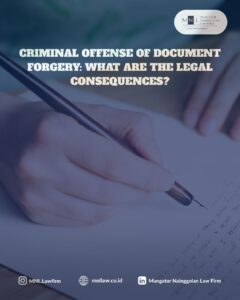
- INTRODUCTION
Essentially, the criminal offense of document forgery is generally regulated under Articles 263–266 of Law No. 1 of 1946 concerning the Criminal Code (KUHP).
The forgery of documents as outlined in each article (Articles 263–267) varies depending on the elements of each provision. However, broadly speaking, document forgery refers to the creation of a document that appears to be authentic and reliable, when in fact the maker of the document lacks the authority to produce it or the contents of the document do not reflect the actual circumstances.
Document forgery can take various forms, such as forging a signature to make it seem genuine or falsifying the content of a document with the intent to benefit the forger. Additionally, the forgery of documents as defined in the Criminal Code must involve documents that can give rise to rights and provide advantages to the forger.
- FORMS OF DOCUMENT FORGERY
The forms of document forgery are diverse, as specified in the Criminal Code, and include the following:
- Article 263 of the Criminal Code
Article 263 of the Criminal Code states:
“(1) Any person who creates a false document or forges a document that can give rise to a right, obligation, or debt relief, or is intended as evidence of a matter, with the intent to use it or have others use it as if its contents were true and not forged, shall—if such use could cause harm—be punished with imprisonment for a maximum of six years due to the forgery.
(2) The same penalty shall apply to any person who knowingly uses a false or forged document as if it were genuine, provided that such use could cause harm.”
The criminal act described in Article 263 of the Criminal Code is referred to as simple document forgery, where an individual falsifies a document with a specific intent to benefit themselves due to the consequences of the forged document.
- Article 264 of the Criminal Code
Article 264 of the Criminal Code states:
“(1) Forgery of a document shall be punishable by imprisonment for a maximum of eight years if committed against:
- Authentic deeds;
- Debt letters or certificates issued by a state or its subdivisions or by a public institution;
- Debt letters or share certificates issued by an association, foundation, company, or corporation;
- Coupons, dividend or interest certificates related to the documents mentioned in points 2 and 3, or replacement certificates issued in lieu of such documents;
- Credit letters or commercial documents intended for circulation.
(2) The same penalty shall apply to any person who knowingly uses the documents mentioned in the first paragraph, the contents of which are untrue or forged, as if they were genuine and unaltered, provided that such forgery could cause harm.”
Essentially, Article 264 of the Criminal Code regulates the same act of simple document forgery as Article 263, but it specifically addresses the forgery of authentic deeds and documents related to debt obligations.
- Article 266 of the Criminal Code
Article 266 of the Criminal Code states:
“(1) Any person who instructs the inclusion of false information in an authentic deed regarding a matter that must be truthfully stated in the deed, with the intent to use it or have others use it as if the information were accurate, shall—if such use could cause harm—be punished with imprisonment for a maximum of seven years;
(2) The same penalty shall apply to any person who knowingly uses the document described in the first paragraph, the contents of which are untrue or forged, as if they were genuine and unaltered, provided that such forgery could cause harm.”
The forgery addressed in Article 266 of the Criminal Code pertains to falsifying documents issued by public officials, such as a Land Deed Official who creates a fake Sale and Purchase Deed. It may also apply to parties who instruct or direct such officials to commit such acts.
- CONCLUSION
As outlined above, all forms and aspects of forgery involving documents and authentic deeds can be prosecuted under Articles 263, 264, and 266 of the Criminal Code. However, it is important to note that only forged documents that can give rise to rights—such as diplomas, ID cards, and similar documents—are subject to criminal penalties.
Additionally, if an individual files a lawsuit in a District Court based on falsified circumstances, they may also meet the elements of Article 266 of the Criminal Code if a court ruling establishes the forgery in the lawsuit they submitted.
